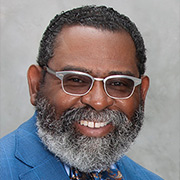
Gary A. Smith
Co-Founder & Senior Partner
Education: BA, Yale University
Company Name: Ivy Planning Group
Industry: Consulting
Company Headquarters Location: Bethesda, Maryland
Number of Employees: N/A
Words you live by: When my ego goes up, my money goes down.
Who is your personal hero? My mom and dad
What book are you reading? Tom Clancy and Lee Child
What was your first job? Salesperson at Wilson’s men’s clothing store
Favorite charity: Sigma Pi Phi fraternity’s Beta Mu Boulé foundation
Interests: Golf and photography
Family: Married for 36 years, with 3 adult sons
The Changing World of Work
We can no longer apply old school approaches to work in the 21st Century. The pandemic has revealed that we can work differently. Think of the organizations that told their employees that working from home wasn’t advisable or even possible, then suddenly had to flex because they needed work done. Now imagine how many of those organizations are rushing to return to the office and traditional work patterns. Why are they rushing to return, and will the workforce of today agree to working that way? Something has to change.
The employer-employee contract is broken. Employee development, training, coaching, mentoring, and sponsorship aren’t occurring consistently and equitably organization wide. Many people managers readily admit that the ratio of time they spend as doers rather than coaches to their employees is 80/20. That’s right, 80 percent of their time is spent doing something other than developing the people they lead. And those same managers believe their organizations are okay with how they’re spending their time. The organizations say they want employee development, but won’t allocate the time for it to happen. That has to change.
What does the new world of work look like? It starts with an appreciation of what people do, not where they do it. It requires developing new ways of evaluating the contributions of knowledge workers. Not assembly line workers who must be someplace specific in order to work or measured by the hours they work, but workers whose contributions are about outputs and outcomes. Given an internet connection, this new world worker is immediately productive. How do we measure these new workers? How do we reward and motivate them? How do we ensure that they are connected to their teammates and the culture of the organization? How do loyalty and appreciation for the mission get established?
The organization that figures out how to do this will have an unlimited supply of talented people who can’t wait to be a part of something special—people who will work harder, share their creativity, and apply their discretionary effort, all because they appreciate being trusted and treated fairly, while having the ability to better connect work, family, and their lives to something they deem to be meaningful. It will also require answering tough questions: Am I trying to control people, do I trust people, and do I believe that managers are responsible for developing their people more than anything else they could do?
Ultimately, it requires a migration from management to leadership.
The pandemic has taken a horrific toll on so many parts of our society. Let’s make sure we don’t ignore the opportunity to realize the possibilities—to better care for our employees, to reinvent how we work, and to rewrite the employer-employee contract in a way that serves everyone. Don’t miss the opportunity to dream big.






